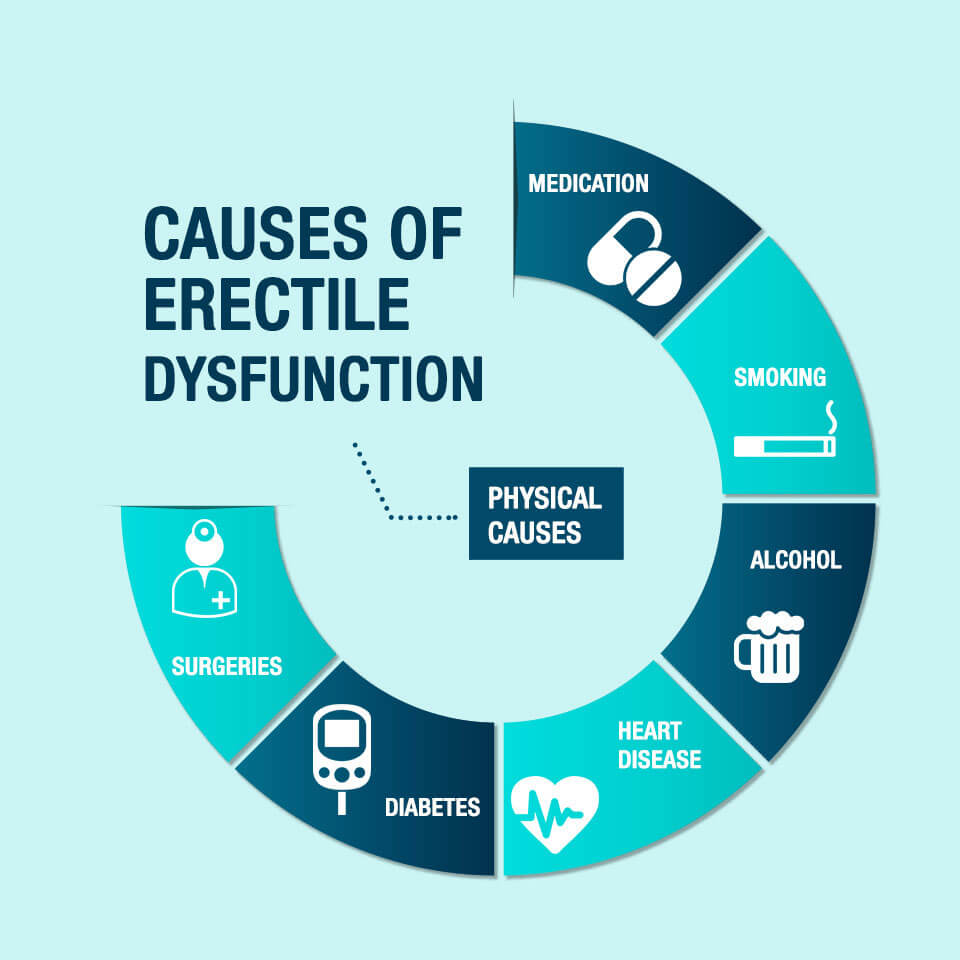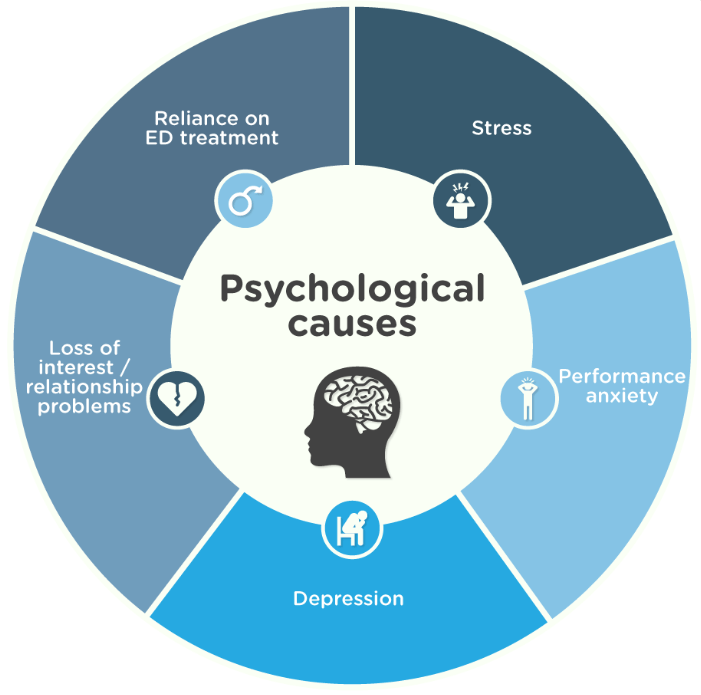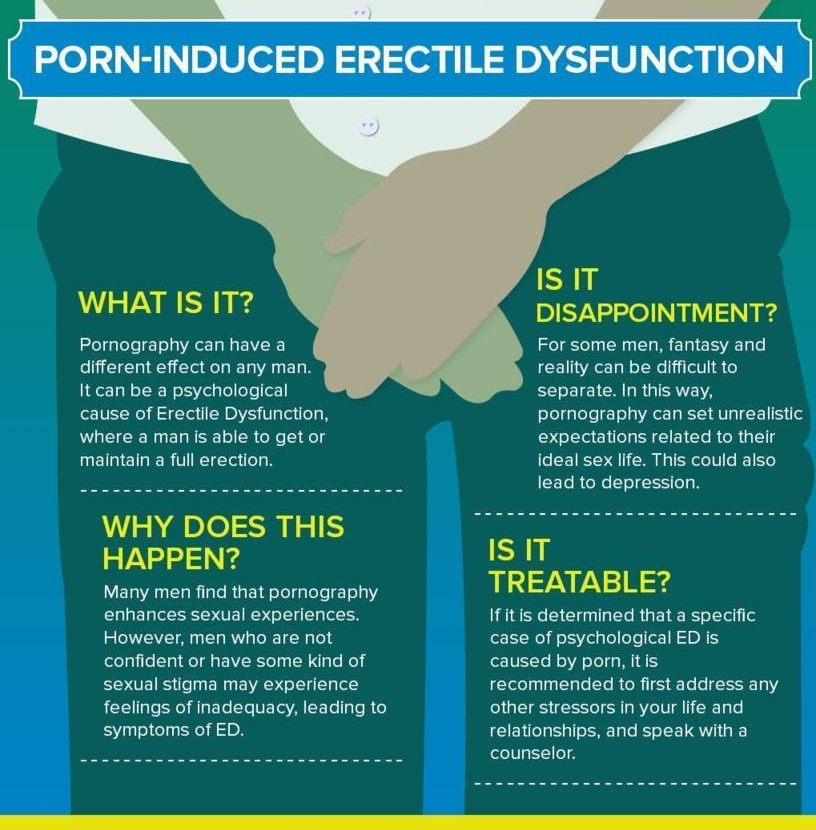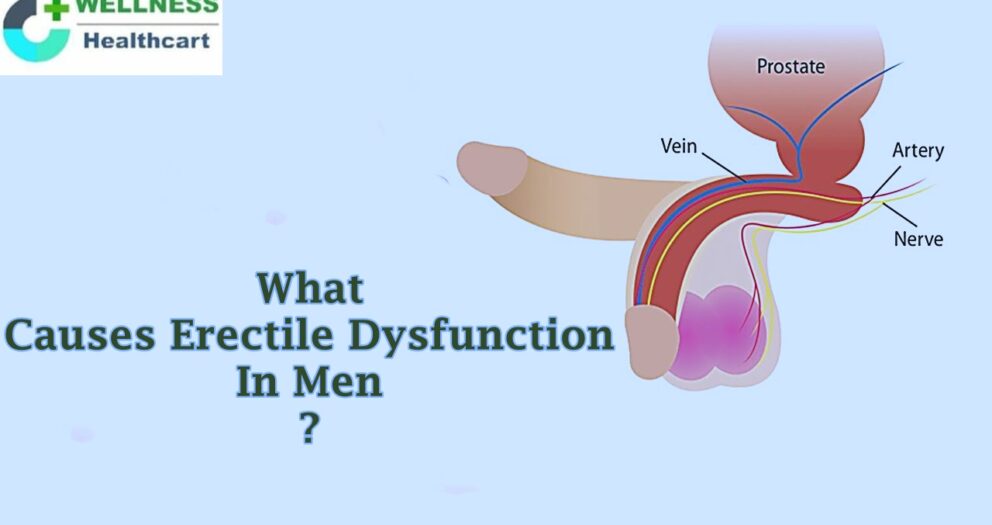Erectile dysfunction ( ED) is when a man finds it difficult to get or keep an erection that’s firm enough to have sex on a regular basis. Although most men have trouble with this issue at some stage in their lives, the condition is only treated medically as ED if adequate sexual performance has been unachievable for some time on several occasions.
There are many reasons for ED – some physical, some psychological. And since the release of ED treatments such as Cenforce, awareness about the condition of ED has become widespread and is now much more openly discussed with physicians than before.
Let’s discuss the common causes – both physical and psychological – of erectile dysfunction and what can be done to treat the condition.

Physical Causes of ED
While most men suffer sexual performance issues occasionally, a chronic issue is one that progressively worsens or happens routinely – and this may be diagnosed by a doctor as erectile dysfunction. ED can happen due to physical causes, such as when blood flow to the penis is limited or blocked.
ED may also be an early warning sign of a significant underlying condition that limits blood flow in the body, such as heart disease , high blood pressure, atherosclerosis or diabetes. Other factors that may contribute to ED include age, high cholesterol, smoking, drug or alcohol abuse , obesity and a lack of exercise.

Low testosterone levels (low-T) can also blame the shoulder for certain ED cases. If having an erection is painful, or the penis has a pronounced curve, this may be due to Peyronie’s disease – a disorder that urologists frequently successfully treat. Some drugs can also have undesirable side effects such as ED for certain health conditions.
Psychological and Other Causes of ED
One of the issues with ED is the emotional toll it takes upon the self-esteem of a man. ED can cause stress , which in turn places greater pressure on performance, causing more performance-influencing problems.
So it may be a vicious loop where the physical is influenced by the psychological, and vice versa. The fear of sexual failure places increased pressure on performance, creating anxiety , depression, low self-esteem and performance doubts.
When erectile dysfunction is caused by psychological triggers, it is referred to as psychological impotence. Some of the most common causes of this type of ED include the following:

- Stress
- Anxiety
- Relationship problems
- Depression
- Performance anxiety
- Guilt
- Low self-esteem
- Pornography addiction
1.Stress and Anxiety
Though stress and anxiety are two different things, they are closely related when it comes to issues of erectile dysfunction. In many cases, stress is the underlying factor. But that stress causes anxiety, which then triggers more stress — making it into a vicious cycle.
If you take a look at the physical side of things, however, you’ll see that stress and anxiety are even more closely related than you may realize.
Many men do not realize that there are different types of erections three to be exact. A reflexive erection is due to physical stimulation, while a psychogenic erection is triggered by visual or mental images. A nocturnal erection is exactly what it sounds like — one that occurs during sleep.
All three of these involve specific bodily systems, including hormones, muscles, blood vessels, nervous system and emotions. If any of these systems become compromised, it can cause ED.

2.Relationship Problems
Cultivating and maintaining a healthy relationship is not easy. It takes time to truly get to know someone and trust them. If you and your partner are experiencing trouble with your relationship, it could very well bleed over into your sex life.
It could also be the case that your erectile dysfunction is creating problems in the relationship — another example of the cycle of ED that can affect many different aspects of your life.

Communication is the first step in resolving this particular cause for psychological ED but it is also one of the most difficult steps to take.
3.Depression
Unless you have experienced depression for yourself, you may think of it as something akin to sadness. Clinically speaking, it’s a lot more than that.
Depression acts much like an anchor, weighing you down in body and mind, affecting all aspects of your life — physical and mental.
Some of the most common symptoms of depression include the following:
- Feelings of sadness, hopelessness or emptiness
- Frustration, irritability or angry outbursts
- Loss of interest in most or all normal activities
- Fatigue, tiredness or a general lack of energy
- Anxiety, restlessness or agitation
- Low self-esteem or guilt
- Difficulty concentrating or thinking
4.Performance Anxiety
In many ways, performance anxiety becomes a self-fulfilling prophecy, wherein you become nervous about being able to satisfy your partner. Eventually that nervousness may lead to sexual dysfunction.
In some cases, performance anxiety is triggered by negative self-talk — worries about being able to achieve an erection, pleasing a partner or ejaculating too early.
If you have had erectile issues in the past, those experiences will add to the weight of performance anxiety.
5.Guilt and Low Self-Esteem
Many men who suffer from erectile dysfunction feel guilty about being unable to please their partner. If the problem persists, the guilt becomes more than just a side effect — it can contribute to the ongoing cycle of ED as well.
Guilt is often paired with low self-esteem, and not just in men with erectile dysfunction. Guilt and shame are feelings that are commonly linked to mental health issues such as depression. In fact, feelings of worthlessness and inappropriate guilt is one of the clinical criteria for major depressive disorder, according to the DSM-5.
6.Pornography Addiction
Pornography addiction or dependence is a potential cause for ED that many men fail to consider.
If you spend a great deal of time watching and masturbating to pornography, it may cause you to develop unrealistic expectations about sex or about your sexual partners.
Researchers have actually studied this effect and have given the condition its own name — pornography-induced erectile dysfunction (PIED).
On a physiological level, if you’re constantly watching — and masturbating to — pornography, you may experience what’s clinically called, “hyperstimulation” or, as you’ve likely heard it referred to, “death grip syndrome.”

Treatment of Erectile Dysfunction
Non-invasive therapies are, as with most diseases, evaluated before invasive solutions. The least invasive way of treating ED is to strengthen the muscles on the pelvic floor by performing Kegel exercises.
Other treatment methods include oral medicines, such as Viagra, Levitra, and cialis. These all increase blood flow to make an erection more firm.
There is also the prostaglandin E1 injection, vacuum pumps, penile implants, or vascular surgery for people who can’t handle oral medications to fix blood vessel problems. Although surgery is usually reserved as a last resort, the success rate is very high.
ALSO CHECK
You Need to Know About Erectile Dysfunction (ED)
Waking Up With An Erection What Does It Mean?
6 Tips For Open & Honest Conversations About Erectile Dysfunction
CAN TOO MUCH PORN GIVE YOU ERECTILE DYSFUNCTION?







Write a comment
You must be logged in to post a comment.